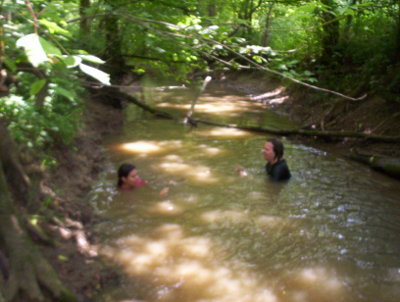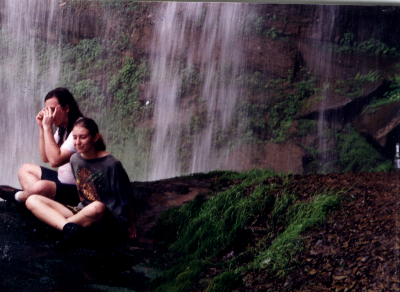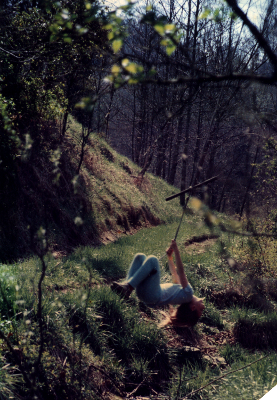
Developing an appreciation for nature
 Although the comments were
divisive, I found our previous Walden discussion, about whether
hunters appreciate nature more fully, very
thought-provoking. For those of you who don't obsessively
read the comments like I do, I want to draw your attention to a few
comments (both on the blog and off) that delved deeper into the
issue.
Although the comments were
divisive, I found our previous Walden discussion, about whether
hunters appreciate nature more fully, very
thought-provoking. For those of you who don't obsessively
read the comments like I do, I want to draw your attention to a few
comments (both on the blog and off) that delved deeper into the
issue.
First, Chris L. started
us off the right foot with his statement:
"We are
part of the ecosystems in which we live whether we acknowledge
it or not."
Ikwig retorted:
 "Personally,
I spent my childhood pretending to be a pioneer woman, running barefoot
through the fields, streams, and woods all around our home. I got
quite good at recognizing plants, insects, and birds, and could tell
the time by the position of the sun. No one needs a gun in order to learn about
the natural world."
"Personally,
I spent my childhood pretending to be a pioneer woman, running barefoot
through the fields, streams, and woods all around our home. I got
quite good at recognizing plants, insects, and birds, and could tell
the time by the position of the sun. No one needs a gun in order to learn about
the natural world."
And my father sent me a
thought-provoking email about his own experiences:
"I think the noble hunter thesis is a
stereotype which needs balance. I grew up among hunters, some of
whom became close to nature in ways other than stalking game and
killing it. I did some of that myself when young. Hunting can be a pathway for closeness to
nature, but it is not the only way.
"I remember how my father introduced me to nature: picking berries, gathering hickory nuts, cracking beech nuts for their tiny fruit, hunting the perfect Christmas tree, fishing on the creek bank, walking thru woods to find paw paws and telling me about the great chestnut trees he knew as a boy, growing a garden, digging with a harness mule and picking up potatoes on shares when he was on strike."
"I remember how my father introduced me to nature: picking berries, gathering hickory nuts, cracking beech nuts for their tiny fruit, hunting the perfect Christmas tree, fishing on the creek bank, walking thru woods to find paw paws and telling me about the great chestnut trees he knew as a boy, growing a garden, digging with a harness mule and picking up potatoes on shares when he was on strike."
 And Everett gave us a vegetarian
alternative for partnering with nature:
And Everett gave us a vegetarian
alternative for partnering with nature:
"I
also think that wild edible
foraging could easily fill that
niche for people who don't like to hunt."
What I found most interesting is that the commenters who delved beyond their knee-jerk reaction to the issue were all suggesting ways of partnering with nature, not merely being a tourist in the woods. Sure, we all got a lot of simple pleasure out of playing outside as kids, but the experiences that really changed us involved creative problem-solving in the outdoors --- figuring out how to build houses out of branches, herd minnows into a bucket, or collect delicious blackberries without getting scratched up or accidentally swallowing a stink bug. I'll bet those are nature-appreciation experiences we can all agree on.
Our chicken waterer keeps the coop dry and hens
happy.
Want more in-depth information? Browse through our books.
Or explore more posts by date or by subject.
About us: Anna Hess and Mark Hamilton spent over a decade living self-sufficiently in the mountains of Virginia before moving north to start over from scratch in the foothills of Ohio. They've experimented with permaculture, no-till gardening, trailersteading, home-based microbusinesses and much more, writing about their adventures in both blogs and books.
Want to be notified when new comments are posted on this page? Click on the RSS button after you add a comment to subscribe to the comment feed, or simply check the box beside "email replies to me" while writing your comment.

I can think of two people in my community that are big on being in nature. One is a trapper who knows a lot about animals, wildcrafting, and the forest ecosystem. Unfortunately there doesn't seem to be much of an appreciation of that ecosystem (he's known for over-harvesting). The other is a woodsman who hunts as many around home do, but the majority of the time he goes out armed with a camera instead of a gun. I think it's how you see what you get from the forest. Is it a place to go to get things you can consume or is it a system you can try to function responsibly in.
Any good trapper is very careful about over trapping any one area. If you remove too many animals they won't repopulate to numbers to make that area worth trapping the following year. Over trapping occurs, but is something a serious trapper tries to prevent.
I might mention, if the trapper is doing some kind of Animal Damage Control work then they are trying to get all the animals and it can be "over trapped".
He typically traps around the waterways of Crown land, logging company land (some of the big logging companies give access for ATVs, hunters and trappers) or through the land of some of his older friends. I was always most bothered with beavers, which were never around when I was growing up, but have returned to the area in the last 5 or 6 years.
On the other hand, he does help get rid of some of the mink problem in our area. There are big (million+ animal) fur operations in the next county and several dozen escape ever year and seem to make a bee line to our chicken coop or my neighbors rabbit hutches. Unfortunately it seems when you remove one mink, another comes down the river system and fills the void.
"Is it a place to go to get things you can consume or is it a system you can try to function responsibly in." I think that Matthew ~B got it just about right with this sentence; sadly there are plenty of people out there, both hunters and non-hunters, who take the consumer culture attitude into the forest with them and do a lot of damage, one way or another. It's the people (again, both hunters and non-hunters) who understand that they are a part of the system and have a function in it as surely as every other bit of fauna and flora who do their best to perform their function carefully and thoughtfully.
I liked what you said too, Anna, about creative problem solving: I think, looking back on my own experiences, that you're probably right and that is, at it's most basic, what actually helps us to develop and appreciation for nature and our place in it. It's not just about learning, but about interacting with the world around us.
Heath --- It does sound like intentionally overtrapping might be happening in certain cases. (A bit like me and my push to lower the deer population.)
Matthew --- That's a shame to remove the beavers! We seemed to have nearly lost them here for a while too, then they started showing back up maybe fifteen or twenty years ago. Very little trapping happens here, though, so I think they'll continue to make a comeback.
Ikwig --- "It's the people (again, both hunters and non-hunters) who understand that they are a part of the system and have a function in it as surely as every other bit of fauna and flora who do their best to perform their function carefully and thoughtfully." Nicely said!